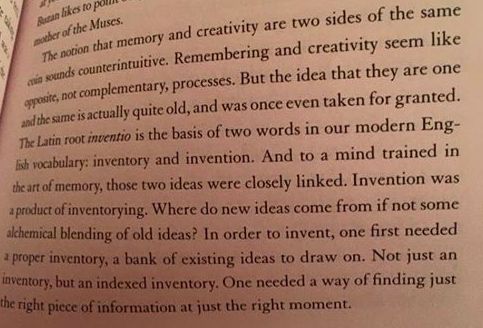I wrote a piece for The Guardian about the fragmentation of strategy problem I explored in my book, and thought I'd coined a new appropriation for the solution, which I called "Full Stack Strategy".
In essence, strategy is perforce holistic, and the communication industry's fragmentation into discipline specific agencies works against that:
All these agencies created strategist roles to fight their way upstream to the client table, to spawn budget for their ideas, to justify all those ongoing retainers. Managing all these little strategies continues to drive clients to madness.
Then some people pointed me to this great Medium piece by Camilla Gray about "full stack strategy".
She uses it slightly differently - not about agency fragmentation but about the impact of digital and the need to understand brand as prime mover of corporate behavior - but to the same point:
Brand strategy needs to extend all the way from the core of the business to a user or customer and all the way back in again. The need for a Full Stack Strategy is relatively new. Digitisation, user-centricity, and a heightened emphasis on company culture has made corporate agility a must.
I very much agree - we approached strategy this way at Naked, pulling budget from advertising to training and changing the incentives for staff at the call centre, for example.
As I said here, regarding digital brand strategy:
digital brand strategists need to be hybrid thinkers, concerned with who and what and where and when and why – a complete system approach. Business, brand, behavior, technology, content, channel, social and so on.
I don't remember reading this piece before - it was written in Feb - but realistically I almost certainly have, it's very much the kind of thing I would read.
So this is probably a case of what's called cryptomnesia which is when you have an idea which is actually a memory that your brain forgets it saw elsewhere.
It's incredibly common, probably because this is how your brain makes ideas, by indexing things it knows against the problem at hand, combining inputs to take advantage of the mathemagic of combinatorics.
Ideas, as we have discussed before, are new combinations.
This notion — that “our” ideas are the combinatorial product of all kinds of existing ideas we’ve absorbed in the course of being alive and awake to the world — is something many creators have articulated, perhaps none more succinctly than Paula Scher.
This fusion of existing bits into new combinations is a largely unconscious process, and for all its miraculous machinery, one serious downside is that it often obliterates the traces of the original sources we unconsciously fold into our “new” ideas.
In fact, the words for creating and remembering are strongly linked because memory and creativity are strongly linked:

[HT my mate Clare, who sent me this, from Moonwalking With Einstein]
One cannot invent without proper inventory.
Then, yesterday I read this piece about how to use our programmatic advertising inventory properly, or at least make it suck less, with creativity.
It mentions an idea called "full stack creativity":
full stack creativity, by which I mean a person (or small team) that comes up with ideas, makes the stuff, looks at the metrics, and then makes the optimization decisions.
Media people and analytics people can only make programs better through reduction…taking out the things that aren’t working.
But when creative people are involved in optimization they can actually make new things, responding to the feedback the market is giving them, and that’s much more powerful.
which is yet another way thinking about integration and fragmentation problems.
All of which probably just means that the full stack metaphor is one whose time has come, and probably on its way to gone through overuse, as is the way of such things, especially in advertising.
But, this also feels like part of a larger contraction in culture, a movement, a swing of the pendulum.
Culture seems to work this way, yinning and yanging, swinging hard in one direction, discovering the opposite in its own extreme, swinging back.
Mainstream and counter culture are contrapuntal harmonies.
The great specialization, of Ford and Taylor, of factories and production lines, of corporations and academia, has begun to struggle beneath its problems.
Its benefits are well known, in production terms thanks to Ford in organizational terms thanks to Coatse, who first explained The Nature of The Firm.
Production lines achieve huge efficiencies by maximizing the fragmentation of jobs to minimize skill requirements and training.
Firms mitigate transaction costs of the market by housing specialists together to create a larger more efficient machine that solves problems - the company. [See The Org for more on this]
The downsides for production lines is that it creates mind numbing repetitive jobs ideally suited for robots.
The downsides for organizations is that communication and collaboration are really hard, especially between different kinds of experts, and create their own costs, which can ultimately overwhelm the gains made in transactions costs [this is when companies because feudal bureaucracies and start to die].
Academics require PHDs to push into an unknown domain of knowledge so far that it's hard for anyone who isn't a peer to understand them, and it makes the peer review pool highly competitive, because of the paucity of grants.
Further, the danger is in creating what the Germans call a "fachidiot" or subject matter idiot, so deeply involved in a topic as to be tunnel blind:
"Fachidiot" which literally, translated into English means "subject idiot" defined by the Institute as: "Someone who knows a lot about a particular field, in a similar way to a one-track specialist.
The difference is that a one-track specialist still notices what is going on around him. A Fachidiot simply doesn't…"
Breakthroughs, especially in areas where experts have been stuck for some time, are often happened upon by scientists of adjacent specialisms, because they know enough, but not too much, about the topic.
As I've written before, the Western world sees things in separate pieces, in binary logical terms, where as Eastern thinking tends towards the holistic, make me one with everything, as the buddhist monk said to the New York hot dog vendor.
Rather than thinking of these are different ideas, they are perhaps different mental models, appropriate to different tasks, different ways of thinking about reality and tackling problems. Different models are useful at different junctures, when you have fully explored one model, it makes sense to look at its opposite to continue to explore.
So you can see this cultural pendulum as swinging from pieces to the whole, back and forward, from components to systems, from l33t specialists to full stack, and back.
Read more from Faris Yakob here.
